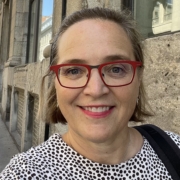Much of my career involved transforming Toronto’s Don Valley Brick Works from an abandoned brick factory and brownfield, into Evergreen Brick Works, an award-winning showcase for innovation and sustainability. Throughout the redevelopment process, we sought to honour the site’s industrial city building past and its workers, while looking at how these experiences can inspire action for creating more sustainable cities of the future. This experience now serves as the basis of my PhD in Interdisciplinary Studies at Trent University (Peterborough, Ontario) where my research is exploring how more equity-based approaches to the redevelopment of post-industrial landscapes can contribute to creating more inclusive cities.
My professional background has focused on community-based, participatory design and engagement processes that create vibrant public spaces and build stronger communities. I’m also committed to advancing social entrepreneurship, leading and helping organizations whose missions contribute to community wealth and create jobs that are good for people and the planet. Last but not least, I am an active volunteer and serve on several charitable boards, and I hold Honours and Master’s degrees in environmental studies and watershed planning.
Project Statement
Remaking Industrial Landscapes for the Inclusive City
My research seeks to identify practical examples of achieving greater urban socio-spatial justice through the adaptive reuse of industrial heritage buildings. To examine these relationships, I am using a qualitative comparative case study that focuses on two post-industrial redevelopment projects: Coal Drop Yards in London, United Kingdom and the Distillery District, located in Toronto, Canada. The transformation of these two landscapes into sites of leisure, tourism and consumption has been catalytic to broader processes of urban transformation and creative city building. Yet, while the specific stories, histories and experiences of both sites are unique to their locales, the broader arc of their narratives mirrors that of deindustrialization’s creative destruction in which the remaking of these urban spaces using consumptive strategies for middle and upper class tastes has been achieved at the expense of use of lands for affordable housing and low-rent uses.
Using an international approach, my research contemplates broader global economic, political and social forces that contributed to urban regeneration, while the focus on specific sites informs how these forces of postindustrialism played out on the ground. My research asks: in what ways did these redevelopment projects consider social justice? How might have social justice outcomes been achieved? How can these insights inform future projects? Ultimately, my research project aims to formulate strategies for industrial heritage revitalization initiatives that achieve more equitable results, that support greater diversity and that represent greater democratic control over the production of urban space.
Website (if applicable): https://www.trentu.ca/graduatestudies/interdisciplinary-social-research-phd
Program of study (if applicable): Interdisciplinary Social Research
Research supervisor (if applicable): Professor Roger Picton





 Photo: Collettivo Gkn © Andrea Sawyerr
Photo: Collettivo Gkn © Andrea Sawyerr